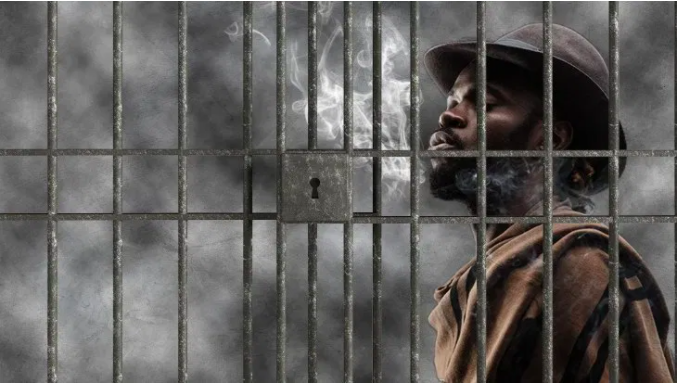The cannabis industry is thriving, and as the stigma behind the plant begins to fade, public officials are beginning to see the benefits — medicinally and otherwise — of legalizing a plant that has contributed to a revolving door of people in and out of the prison system. Cannabis is steadily becoming more acceptable to mainstream society, with 30 states and the District of Columbia having legalized cannabis in some capacity, and several states have decriminalized possession of small amounts of cannabis — so why are our prisons still crowded with drug offenders, and why have we continued to allow this to happen?
According to the Prison Policy Initiative (PPI), “The American criminal justice system holds almost 2.3 million people in 1,719 state prisons, 102 federal prisons, 1,852 juvenile correctional facilities, 3,163 local jails, and 80 Indian Country jails as well as in military prisons, immigration detention facilities, civil commitment centers, state psychiatric hospitals, and prisons in the U.S. territories.” America incarcerates more people per capita than anywhere else in the world.
America also holds more people “before trial than most countries have in their prisons and jails combined,” according to PPI. If we take a closer look at the numbers, drug offenders are consistently the largest percentage of those incarcerated. In 2017, nearly 50 percent of those in federal prison were there for drug offenses, according to the Federal Bureau of Prisons (FBP). This year, the number is just below 50 percent.
With the growing prison population comes little to no services for rehabilitation. Overpopulation also results in an increase in violence, as well as health and safety concerns, among other things; the Incarcerated Workers Organizing Committee and Jailhouse Lawyers Speak decided enough is enough. They are working with prisoners all over the nation to deliver their 10 national demands from the men and women within the federal, immigration and state prisons.

Here are their demands:
1. “Immediate improvements to the conditions of prisons and prison policies that recognize the humanity of imprisoned men and women.”
The Bureau of Justice Statistics reports that, as per anonymous inmate surveys, as many as 200,000 prisoners are the victims of sexual abuse every year. As Harvard University criminologist Dr. James Gilligan told ABC News, “As long as they [violent inmates] cooperate, the prison authorities will permit them to have their victims.”
2. “An immediate end to prison slavery. All persons imprisoned in any place of detention under United States jurisdiction must be paid the prevailing wage in their state or territory for their labor.”
PPI has tracked how much inmates make for their labor, and in at least 25 states inmates make less than $1/hour; in at least 12 states inmates makes less than $2/hour; and in at least 6 states inmates make less than $5/hour for their labor.
3. “The Prison Litigation Reform Act must be rescinded, allowing imprisoned humans a proper channel to address grievances and violations of their rights.”
The PLRA has limited court oversight of prisons and jails, and made it close to impossible for an inmate to file a lawsuit about the conditions of their confinement.
4. “The Truth in Sentencing Act and the Sentencing Reform Act must be rescinded so that imprisoned humans have a possibility of rehabilitation and parole. No human shall be sentenced to Death by Incarceration or serve any sentence without the possibility of parole.”
States with truth in sentencing laws do not recognize good time, earned time and even parole board release are restricted in order to reduce the rate of release. The Sentencing Reform Act aimed to abolish federal parole.
5. “An immediate end to the racial overcharging, over-sentencing, and parole denials of Black and brown humans. Black humans shall no longer be denied parole because the victim of the crime was white, which is a particular problem in southern states.”
According to the ACLU:
- In Alaska, black people are 1.6 times more likely to be arrested for cannabis
- In Iowa, black people are 8.34 more likely to be arrested for cannabis
- In Washington, D.C., black people are 8.05 times more likely to be arrested for cannabis
- In Minnesota, black people are 7.81 times more likely to be arrested for cannabis
- In Illinois, black people are 7.56 times more likely to be arrested for cannabis
- Across the board, people of color are more likely to be stopped, arrested and jailed for cannabis
6. “An immediate end to racist gang enhancement laws targeting Black and brown humans.”
Gang enhancement laws add mandatory additional years onto a prison sentence if the person convicted is thought to have been involved with a gang — something as simple as being seen with someone who is thought to be gang-affiliated could land someone in this category.
7. “No imprisoned human shall be denied access to rehabilitation programs at their place of detention because of their label as a violent offender.”
Studies have shown that giving violent offenders the tools to develop skills and self-esteem increases their ability to empathize and feel remorse, which helps reduce the frequency of violent repeat offenders.
8. “State prisons must be funded specifically to offer more rehabilitation services.”
The privatization of the prison system has resulted in companies like CoreCivic (formerly the Corrections Corporation of America) and The GEO Group, who monopolize over half of the business; CoreCivic alone generated over $1.7 billion in revenue in 2012. All of us — the American taxpayers — are making them rich.
9. “Pell grants must be reinstated in all US states and territories.”
According to the Education Department, 25,168 prisoners active in the 1993-94 school year received Pell grants — that’s less than one percent of all grant recipients.
10. “The voting rights of all confined citizens serving prison sentences, pretrial detainees, and so-called ‘ex-felons’ must be counted. Representation is demanded. All voices count.”
In what the NAACP calls “prison-based gerrymandering,” most prisoners cannot vote, but they are often still counted in the legislative district of their prison — which helps to determine the number of representatives in that state and the state’s electoral votes. Sometimes prisoners are even counted in their home districts, but are still not allowed to vote. It gives power to districts with prisons and obstructs the “one person, one vote” principle.
August 21 was the 47th anniversary of the murder of George Jackson, a Black Panther prison organizer, by correctional officers when he attempted to escape San Quentin Prison — this is also the date the prisoners chose to begin the strike. September 9 is the 47th anniversary of the Attica Rebellion— a takeover of Attica prison by inmates who, earlier in the summer, had submitted a letter to the administrations and prison officials with a list of demands that included “improvements in the working and living conditions and a change in medical procedure.” Instead of taking the prisoners’ manifesto of demands into consideration, the prison placed anyone who had the manifesto in solitary confinement for 60 days. The next day, prisoners took over the prison to negotiate their demands. September 9 of this year is when the nationwide prison strike of 2018 will end.
Although it is difficult to know exactly how many prisoners are participating in this strike, IWOC maintains that thousands are still striking, and it has been reported that prisoners in at least 17 states affirmed their involvement in the strike. Detainees in the Northwest Detention Center in Washington state are refusing meals; prisoners in South Carolina at Broad River Correctional Institution, Lee Correctional Institution, McCormick Correctional Institution, Turbeville Correctional Institute, Kershaw Correctional Institution, and Lieber Correctional Institution have committed to work strikes and refusing commissary; prisoners in Georgia State Prison are striking, as well as in North Carolina, Ohio, California, Indiana, New Mexico … prisoners all over the country are collaborating through work strikes, sit-ins, boycotts of spending of any kind and hunger strikes.

Corrections officials, of course, have consistently denied that there has been any involvement in the protest at their facilities. Yet within only three days of the strike, prisoners were reporting retaliation from corrections officials for participating in the strike — retaliation that will never have to be answered for due to the Prison Litigation Reform Act, which lands at number three on the prisoners’ list of demands.
Prison reform was promised when legalization of cannabis was proposed; still, many people at a state and federal level sit behind bars for a plant that is legal in over half the country. Mass incarceration is alive and well, and those behind the prison walls have been brutalized since the onset of the prison system. Until those still fighting for the national descheduling of marijuana as a schedule III substance succeed, as well as full legalization across the nation and the freedom of those still behind bars for cannabis offenses, every person who benefits and participates in the cannabis industry should be invested in contributing to the betterment of the prison system.
Jailhouse Lawyers Speak (JLS)— a human rights organization — released an interview with one of the inmates associated with JLS who preferred to remain anonymous “due to widespread repression against imprisoned organizers and prominent politicized prisoners.” When the interviewee was asked about solidarity and the importance of bringing different groups together to create change, they said, “Even the outside support, it makes prisoners understand also that there are people out there that expect us back here to get on the same page, as well. This is why we have to salute the ones out there now that’s really standing up for us and really cheering us on, and really telling us ‘we got y’all back.’ Because it lets prisoners know, this is bigger than me, this is bigger than my little organization, this here’s a movement.”
The Eighth Amendment prohibits against “cruel and unusual punishments,” and yet we have prisoners reporting being handcuffed to their bunk in their underwear for days; rampant bacterial infections that go untreated throughout maximum security prisons; constant stories of inmates dying in prison in solitary and otherwise because of neglect; and the constant sexual abuse that goes unchecked and often is condoned by prison officials.
This is bigger than the cannabis industry. This is bigger than prison reform. This is absolutely a human rights movement that should not be neglected any longer. The assumption is often that if someone is in prison, they deserve the time they’re serving — and whatever harm that comes to them while they are there. It is this lack of empathy that has created a vile breeding ground for institutions that see its inhabitants as less than human and undeserving of compassion or basic necessities.

If you would like to see change in the current system, here are some suggestions from the national Prison Strike press release:
How You Can Help
● Make the nation take a look at our demands. Demand action on our demands by contacting your local, state, and federal political representatives with these demands. Ask them where they stand.
● Spread the strike and word of the strike in every place of detention.
● Contact a supporting local organization to see how you can be supportive. If you are unsure of who to connect with, email millionsforprisonersmarch@gmail.com
● Be prepared by making contact with people in prison, family members of prisoners, and prisoner support organizations in your state to assist in notifying the public and media on strike conditions.
● Assist in our announced initiatives to have the votes of people in jail and prison counted in elections.
● For the Media: Inquiries should be directed to prisonstrikemedia@gmail.com.”

